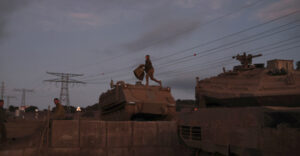An Israeli ground invasion of Lebanon could trigger ‘apocalyptic’ scenes and lead to all-out war, warns a high-ranking diplomat from Lebanon, explaining that the Israel Defense Forces would face troops trained by the British.
According to The Times, Lebanon’s ambassador to London, Rami Mortada, stated that the Lebanese army would not “sit idly by” if Israel proceeded with a ground invasion or launched a heavy aerial assault.
It’s worth noting that last night, the Israeli armed forces announced they had carried out a new round of airstrikes on southern Lebanon, primarily targeting Hezbollah’s rocket launch systems, which, according to them, were “ready to be used immediately… against Israeli territory,” as well as other weapon systems and “terrorist infrastructure.” The Israeli air force “hit around 100 launchers” and “other terrorist infrastructure,” according to a military statement, vowing to continue “demolishing Hezbollah’s capabilities” to “defend the state of Israel.”
IDF shares aerial footage of attack on Hezbollah’s 100 launchers. They also claimed ‘hundreds’ of launcher barrels were destroyed in strikes against the Lebanese militant group.https://t.co/2XVA6i2NPI pic.twitter.com/qj0MZirwKu
— Sky News (@SkyNews) September 20, 2024
Additionally, Israeli artillery struck the Nakoura region of Lebanon, and Defense Minister Yoav Gallant insisted that operations against Hezbollah “will continue.”
Mr. Mortada warned that Hezbollah has evolved into a “formidable fighting force” and stressed that a war on multiple fronts in the Middle East could radicalize an entire new generation in Europe.
“We are facing all the risks of a full-scale conflict in the region, and this is what we are tirelessly trying to avoid… Let’s hope we don’t get there, because that would be an ‘apocalyptic’ scenario for everyone. It would certainly be devastating for Lebanon, but Lebanon won’t be the only one to suffer in such a war. Recent history has taught us that. So, all efforts must focus on preventing such an outcome.”
“There are many dangerous aspects of the Middle East that could reach Europe and beyond,” the diplomat added.
Israel launches intensive airstrikes against southern Lebanon amid escalating tensionshttps://t.co/FTqv7K3lfo
— Anadolu Images (@anadoluimages) September 20, 2024
?: Ramiz Dallah pic.twitter.com/ohVbN8iutK
Nasrallah: There will be terrible retaliation for the deadly attacks with communication devices
Yesterday afternoon, Hassan Nasrallah, the leader of the Lebanese movement aligned with Iran, acknowledged that his faction suffered an “unprecedented” blow following waves of deadly explosions involving communication devices used by its members. He warned of “terrible” retaliation for these large-scale attacks, which his group attributes to Israeli intelligence services.
Officially, Israeli authorities have not commented on these explosions, which followed the announcement by Prime Minister Benjamin Netanyahu’s government that the objectives of the war with Hamas in Gaza have expanded to include the borders with Lebanon and ensuring the safe return of tens of thousands displaced from zones in northern Israel.
Tens of thousands of people have been forced to leave their homes on both sides of the Israeli-Lebanese border since October 8, 2023, when near-daily exchanges of fire began between the Israeli military and Hezbollah.
Amid rising tensions, Israel’s Home Front Command announced new measures in parts of the occupied Golan Heights and eastern Upper Galilee, including in the city of Safed, advising residents to avoid traveling and stay indoors.
Israel will face “terrible punishment” and “just retaliation” both where “it expects it” and where “it does not expect it,” warned Hassan Nasrallah, the head of Hezbollah, a key player in Lebanese politics and an ally of Hamas.
In his televised address yesterday, Nasrallah announced that an internal investigation has begun into Tuesday and Wednesday’s explosions of beepers and radios, which killed 37 people and injured around 3,000 others. These explosions have heightened fears of a large-scale war in the Near East.
“You will not be able to return the residents of northern Israel to their homes,” Nasrallah told Israeli leaders. “The Lebanon front with Israel will remain open until the end of the attack on Gaza,” he insisted.
Hamas expressed its “gratitude” for Hezbollah’s support.
Since yesterday morning, Hezbollah has claimed responsibility for at least 17 attacks on 14 Israeli military positions.
The Israeli army announced that two of its members “fell in battle” in the north.
According to Lebanon’s official news agency ANI, a “hostile drone” flew over areas of southern Lebanon yesterday, broadcasting messages over loudspeakers against Hezbollah leader Nasrallah, accusing him of causing “total destruction.”
The simultaneous explosions of beepers used by Hezbollah members on Tuesday, particularly in Beirut, southern, and eastern Lebanon, killed at least 12 people and injured hundreds more, according to Lebanon’s Ministry of Health. A day later, a second wave of explosions, this time involving radios, killed at least 25 people, bringing the death toll to 37 and the number of injured to 2,931 over two days.
Airlines extend flight suspensions
Against this explosive backdrop, the American airline Delta Air Lines announced yesterday that it is extending its suspension of flights from New York to Tel Aviv until the end of the year. American Airlines had already announced a suspension of flights to Tel Aviv until the end of March 2025, while United Airlines has suspended flights indefinitely.
European airlines Lufthansa and Air France also announced yesterday that they are extending their suspension of flights to Tel Aviv and Beirut.
For its part, Qatar Airways announced that effective immediately, passengers departing from Beirut are prohibited from carrying beepers and radios.
Without referring to the explosions in Lebanon, Israeli Defense Minister Yoav Gallant stated the day before yesterday that the “center of gravity” of the war is shifting “to the north.”
So far, the officially declared goals of the war have been the complete destruction of Hamas, which has been in power in the Gaza Strip since 2007, and the return of all hostages still held in the Palestinian enclave.
“We will carry out our duties simultaneously,” Mr. Gallant said.
According to a Hezbollah security official, the communication devices, both beepers and radios, had been “pre-programmed” to explode.
A preliminary investigation by Lebanese authorities revealed that these devices were rigged with explosives before entering the country, according to a letter from Lebanon’s permanent mission to the Security Council, which came to the attention of the French news agency yesterday.
Lebanon’s foreign minister, Abdallah Bou Habib, announced that he had filed a complaint with the UN Security Council following the Israeli “cyber-terrorist attack, which constitutes a war crime.”
International Reactions
Turkey accused Israel of trying to “extend the war to Lebanon,” while Washington, London, and the UN expressed concern and called for “de-escalation.”
The Iranian Revolutionary Guards, an elite branch of Iran’s military, promised “overwhelming retaliation from the resistance front,” a loose coalition of armed groups across the region that view Israel and its allies, especially the U.S., with hostility.
U.S. President Joe Biden believes that a diplomatic solution to the conflict between Israel and Hezbollah “can be achieved,” and this “is the best option,” said his spokesperson Karine Jean-Pierre to accredited reporters at the White House yesterday.
Meanwhile, French President Emmanuel Macron addressed the “friends” of Lebanon in a video, emphasizing that “there is a diplomatic path” and that war “is not inevitable.”
At the same time, Israeli bombings continue in the Gaza Strip, which has been under siege since the early days of the war, mired in humanitarian disaster after nearly a year of bombardment.
The catalyst for this war, now entering its 350th day, was the unprecedented assault launched by Hamas’s military wing in southern Israel on October 7, 2023, during which 1,205 people were killed on the Israeli side, mostly civilians, according to a tally by the French agency based on official data from Israeli authorities, which includes hostages who were killed while in captivity.
Of the 251 people abducted during the attack, 97 remain in the hands of Palestinian fighters in Gaza, while 33 have been declared dead by the Israeli army.
Since then, over 41,272 Palestinians have lost their lives in extensive Israeli military operations in retaliation in the Gaza Strip, the majority of whom are civilians, according to the latest figures from the Hamas government’s Ministry of Health, which are considered reliable by the UN.
Ask me anything
Explore related questions





